lindsays life

23
Issue
Our Services
For you and your family
Buying and Selling your Home Child Matters
Cohabitation and Prenuptial Agreements
Divorce and Separation Housing and Letting Personal Injury Claims
Powers of Attorney and Guardianships Resolving Family Disputes Rural Services Trusts
Wills and Executries
For Business Agriculture and Farming Banking and Finance
Buying and Selling Your Business Charity Governance
Commercial Property Commercial Disputes and Litigation
Corporate and Commercial Employment Law for Businesses
Landed Estates
Managing a Family Business Renewable Energy Restructuring and Insolvency Technology and IT
23
the life of this magazine
This magazine has been issued by Lindsays on the basis of publicly available information, internally developed data and other sources. Whilst all reasonable care has been taken to ensure the facts stated and the opinions given are correct, Lindsays does not accept any responsiblity for its content and advise that specific advice should be sought regarding the topics covered.
Welcome to our twenty-third issue of Lindsays Life.
The days are drawing in on another year which has had its fair share of ups and downs for many of us. However, while the world around us appears even more unpredictable, we can only prepare ourselves, our families, and our businesses in the best way we can and hope for more positive times as we head into 2023.
It’s human instinct of course to batten down the hatches during unsettled times and delay major decision making until things have settled. Perhaps, you’re waiting to see what happens in the property market before buying or selling. Or maybe you’re deferring the plan to make that Will, for now, as it seems like an extra expense just when day-to-day living is costing more.
In this issue we explore some areas where it doesn’t pay to postpone making those decisions or planning for you or your family’s future.
If you moved in with your partner during lockdowns and now it’s a permanent arrangement, did you update your Will to reflect this? Do you have a property abroad that you want to pass on to family and assume that it falls into your UK-based estate? Do you even have a Will? We include a few articles illustrating the importance of having a Will.
When it comes to buying property you may feel like this is not a good time to make that move. However, property has proven resilient over the last few years despite the turbulent world we live in so it may be worth biting the bullet. We offer some hints and tips on how to buy property smartly.
Our sponsored athlete, elite runner Eilish McColgan, has had a superb year achieving new records and scooping medals. We round-up her successes as well as sharing news of her passion project which aims to support youngsters entering sport. Having extended our sponsorship agreement with Eilish until the end of 2024 we look forward to seeing what she achieves next year.
As ever, Lindsays Life covers a wide range of topics that we hope you find interesting and helpful right now and into the future – whatever it may hold.
 Peter Tweedie Chairman
Peter Tweedie Chairman

petertweedie@lindsays.co.uk 0131 656 5607
To read lindsays life using our accessibility toolkit, simply click below
Read fully accessible version
lindsays life Issue
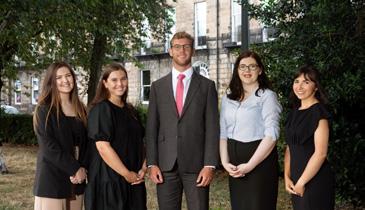



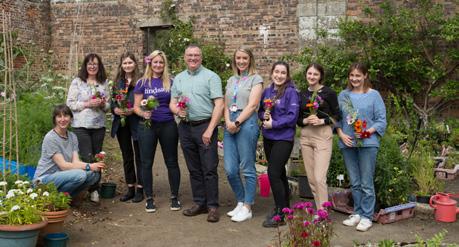




Our sponsorship news Contents Issue 23 02 The importance of making a Will when you co-habit 03 To buy or not buy? 10 All I want for Christmas…is happy kids 05 Can rehiring ‘boomerang’ employees benefit your business? 04 D.I.V.O.R.C.E doesn’t need to be H.E. double L 07 Who will get your place in the sun? 08 Eilish's year of records and medals 11 Good charity needs good governance 06 Calling all landowners and tenants your RCI deadline is coming soon 15 Could you be due a potential payback on Inheritance Tax already paid? 16 News from lindsays 18 Sign up for lindsays life lindsays.co.uk issue 23 14 Say hello to the caveat: your simple, cost effective, early warning trigger system 12 Mental health matters to us
The importance of making a Will when you co-habit
Moving in together is an exciting next step but without an up-to-date Will could you be leaving your partner, and any family you have, in the lurch?
The ‘new home’ cards are still up. There are boxes yet to unpack. So, bringing up the subject of death and ‘what if’ is often put to the back of minds. No one wants to think about death or disaster when they are celebrating the joy of moving into a new home, with their partner, but this key milestone should prompt you to think about your Will.
However, since it’s probably the biggest financial commitment you make, you really do need to consider what would happen should the worst happen. Indeed, in Scotland the rigid laws about who inherits your property if you die without a Will can have unforeseen consequences.
Unlike spouses and civil partners, cohabitees don’t have an automatic right to inherit.
Making a Will can safeguard the future of your loved ones and the home that you’re building together. Otherwise, their fates may lie in the hands of the law and the law may not work in their favour.
What are the risks of dying without a Will when you own a property and cohabit?
No automatic rights
Unlike spouses and civil partners, cohabitees don’t have an automatic right to inherit on death. Depending on your property’s title deeds, your cohabitee may only be entitled to a partial share of the property or, even, no share at all.
Time is ticking
It’s possible for a cohabitee to claim on your estate if you die, but there’s a strict time limit of six months to do this, and any claim is at the discretion of the court. This adds to the pressure on your partner, and other family members, at an already difficult time.
Your wishes go unheard
Alternatively, a cohabitee you never wanted to inherit the property could be successful in a claim in court, at the expense of your intended beneficiaries of your property.
Your children miss out
Your estate could end up embroiled in costly and time-consuming legal disputes adding unnecessary costs to your partner and family members during an already difficult time.
Legal disputes
Your estate could end up embroiled in costly and time-consuming legal disputes adding unnecessary costs to your partner and family members during an already difficult time.
Wills need updating
If you already have a Will, that’s great. Is it up to date? Does it reflect your current wishes? You should certainly review it, particularly at key milestones, and ensure it reflects any change in your circumstances, family dynamics or relationship status.
Caitlin Connolly
Solicitor, Private Client Services caitlinconnolly@lindsays.co.uk 0131 656 5743

So, don’t bury your head in the sand and hope for the best with your new home together, it’s much safer to make a Will. It may be the last thing on your mind when you’re still deciding where to put the sofa and which cupboard to store the teabags in, but it certainly has an important place on your list of things to do.
Philippa Abernethy
Solicitor, Family Law philippaabernethy@lindsays.co.uk 0141 302 8425

02
Making a Will can safeguard the future of your loved ones and the home that you’re building together.
lindsays life issue 23
To buy or not to buy
Looking for a new home may seem daunting in these times of economic uncertainty. So, should you buy now or wait?
The housing market has proven resilient over the past few years despite the backdrop of the pandemic and other dramatic world events. Yes, prices may dip, or they may not - if you want to buy a property and can afford it right now, it may be better to bite the bullet.
Property tends to rise in value over time, so you’re likely to make a profit on any long-term investment.
Ready to take the leap and buy?
Here’s our guide to making the adage ‘safe as houses’ ring true even when the world seems to be a little off kilter.
Be realistic
Ask yourself what you can afford? Make a realistic budget that considers your bills and other living costs. Talk to an Independent Financial Advisor who will be able to ascertain your overall financial circumstances as well as search for the best mortgages to suit you.
Your deposit is key
As large a deposit as you can afford is best for securing the best mortgage rates and minimising your monthly repayments. Remember to set aside additional ‘buying’ costs including solicitor fees, taxes and moving expenses.
Turn detective
Do as much research as possible to get a feel for recent sale prices of similar properties. Your solicitor will be able to assist. Look on Streetview to get a feel for the locality and it’s surroundings. Visit the area in person if the property is of genuine interest to you. This will help
you understand if the area works for you in terms of the local amenities and transport links.
Use the law of averages
See as many properties as you can –the more you see the more likely it is you’ll find the perfect place. Also, not only will it give you an idea of what you do and don’t like it will also give you a clear idea of what you won’t compromise on. Is a garden essential? Would you forsake a bedroom for it?
Be the early bird
Register with your local Solicitor Property Centre website (such as the ESPC or TSPC) to be alerted to suitable properties when they hit the market.
Be prepared
Get all your ducks in a row earlyappoint a solicitor so that you can move quickly when you find ‘the one’. An experienced residential property lawyer can advise you on how much to offer, liaise with your lender to make sure funds are in place when needed, examine Title Deeds and complete all legal work.
Maurice Allan Managing Director Residential Property mauriceallan@lindsays.co.uk 0131 656 5740

View the ESPC property website
View the TSPC property website
03
lindsays.co.uk issue 23
D.I.V.O.R.C.E doesn’t need to be H.E. double L
Alternative Dispute Resolution (ADR) can help keep things civil as well as avoiding court and spiraling costs.
Divorce, as the Tammy Wynette song goes, is H.E. double L. It is a significant and stressful experience. Not only is it emotionally draining but the process itself can be long and destructive to everyone involved; you, your ex-partner and if you have them, your children.
If you could choose a more peaceful and cost-effective route, why wouldn’t you?
Alternative Dispute Resolution (ADR) can be an infinitely preferable way to resolve differences when couples decide to divorce.
The focus is firmly on discovering how, through considered and sensible discussion, couples can work together to achieve a positive and constructive result.
In ADR, mediation involves sitting down in a room with an impartial third party while collaboration is a four-way settlement meeting.
ADR has increasingly been part of a more creative and less prescriptive agenda in Scottish law firms and has several important advantages.

Both forums offer a sensible and thoughtful way for both parties to pinpoint the principal difficulties and things causing the most angst.
With ADR, the parties are more likely to resume a more constructive relationship in the future, which, when there are children involved, is the ultimate aim.
Through ADR, couples can often reach an agreement that works especially well for their unique circumstances.
Going to court pits not only you but your extended families against each other. Things will be said that cannot be unsaid which can sour future relationships between the families and children/ grandchildren. What’s really needed is some bridge-building and ADR can help.
By taking the priority away from assigning blame or fault on either side and shifting the focus firmly on to discovering how, through considered and sensible discussion, couples can achieve a positive and constructive result.
Jennifer Gallagher
Partner, Family Law
jennifergallagher@lindsays.co.uk 01382 346400
04 lindsays life issue 23
3 It can keep your costs down
ADR is much cheaper, often quicker, and less adversarial than court proceedings.
4 It can help you forge a positive future
Through ADR, couples can often reach an agreement that works especially well for their unique circumstances.
1 It sets a positive environment
Mediation and collaboration provide a positive environment, allowing couples to strip away the difficulties and focus on and resolve the financial and childcare issues.
2 It can help you avoid court
Can rehiring ‘boomerang’ employees benefit your business?
+ The PROS +
Acording to a LinkedIn survey, boomerang employees accounted for 5% of all new hires in the UK. A record high, up from 3.9% in 2019.
This trend certainly adds weight to the saying ‘never burn your bridges’. Rehiring so-called boomerang employees, former team members who return days, months or even years after parting ways, has many benefits but may also have its pitfalls.
We've noticed an increasing number of companies turning to former employees. It’s probably quite natural, given the challenges faced by employers following the pandemic and Brexit, that they are turning to those they have previously employed – people who they know have the skills they are looking for.
However, if you’re thinking of bringing a team member back into the fold, make sure you understand the pros and cons of rehiring a boomerang employee.
Jane Watson who leads our prism HR consultancy services sees this rise in the rehire as a positive:

Rehiring should be viewed as largely positive and can be especially useful when looking for specific skills in specialist sectors.
So goodbyes in business are not always permanent.
Jane Watson Head of Prism HR Consultancy Employment
janewatson@lindsays.co.uk
Recouping investment
You can secure experienced employees with reduced recruitment, training and development costs.
New perspectives
Boomerangs often return with new perspectives and knowledge acquired in other work environments. These could include fresh ideas that may help your business grow.
Increased sales or productivity
A returning employee may come back with a newly acquired client base or their return may encourage some of your former customers to return.
Reduced risk
Returning employees are more likely to stay long-term. They’ve found out that the grass is not always greener on the other side and are more committed.
A morale boost
Other members of your team see that your company is open and fluid rather than one that holds grudges. It says a lot about a workplace that someone wants to return.
The CONS -
Colleague disharmony
Boomerang employees may create resentment among the team who remained, especially if the person returns to a more senior, better-paid, post.
Overlooking new opportunities
A previous employee may not always be the best fit for your company. What the company requires at one point in time may be completely different from what’s needed to shape its future. However, it’s easy to overlook other applicants when a trained-up former employee comes knocking at your door.
Changed personality
Perhaps your boomerang has acquired new traits or expectations in their most recent role that make it hard to mesh with your company culture.
Flighty by nature
They left once so will they go again? Are the issues from their previous tenure still a problem? If so, their return may be short-lived leaving your company in the lurch once again.
05
More employers grappling with recruitment issues are turning to former staff to fill vacant roles.
0141 302 8412 lindsays.co.uk issue 23
Calling all landowners and tenants your RCI deadline is coming soon
The Register of Persons Holding a Controlled Interest in Land (RCI) requires certain categories of landowners and tenants to supply information regarding the ownership and control of land by 31 March 2023.
Landowners and tenants - time is ticking for you to provide information to the RCI. It may have taken some years to come into effect, however, the new Register is now a reality and you have until the end of March next year to comply. Failure to adhere with the RCI requirements is a criminal offence and may result in a £5,000 fine.
What is the RCI?
The RCI was introduced in 2022 to improve transparency of land ownership in Scotland. It’s a key component of the Land Reform (Scotland) Act 2016. The intention is to make it easier to determine who has control over areas of land where it isn’t publicly available or easily identifiable from the Title Deeds.
The Register provides information on those people or entities who have influence or control over land or property where they are different from the owner or tenant under a long lease (more than 20 years) as disclosed in the Sasine or Land Register or Companies House. It is public and free to search.
Who and what is to be registered?
Owners of land or a tenant under a long lease (the ‘recorded person’) must provide details of any party with significant control or influence in relation to that land or property (an ‘associate’).
Where a new party becomes an associate the landowner or tenant has 60 days to notify the RCI. In addition the recorded person must notify the associate that they intend to include their information on the RCI.
Updates should also be provided by the landowner or tenant when:
• A party ceases to be an associate
• The owner or tenant ceases to be a party to whom the Regulations apply
• There are any other changes to the information contained on the Register.
Who will be affected?
Trusts, partnerships, unincorporated associations and overseas entities that own or lease land will be most affected by the Regulations.
How to register
Registration is completed online on the Registers of Scotland website which also provides guidance on how to complete the forms. Each owner or tenant (the recorded person) needs to set up an RCI Public Account and add the details of those parties who have a controlling interest but are not narrated in the title deeds (the associate).
The Registers of Scotland website is designed to be user-friendly and details of how to complete the registration forms can be found on the Lindsays website.
Who is not affected?
Regulations have been drafted to avoid duplicating information contained in other public registers. Therefore, parties such as UK Limited Companies, LLPs, Scottish and English Charitable Incorporated Organisations and local authorities are exempt from reporting to the RCI.
Michael Yellowlees

Partner, Head of Rural Services
michaelyellowlees@lindsays.co.uk 0131 656 5669
Alison Mackay
Professional Support Director
Commercial Property
Alisonmackay@lindsays.co.uk 0131 656 5586

Visit the Registers of Scotland website
Read how to complete the RCI forms
06 lindsays life issue 23
Who will get your place in the sun?
A little bolthole abroad is often the dream. In fact, more and more people are making it a reality and now own assets in the UK and abroad. If that’s you then it’s worth considering whether to have multiple Wills to cover the countries in which your various assets are located. If you don’t, are you risking leaving your loved ones with more of a headache than a heavenly retreat?
Foreign Wills
Whether an additional foreign Will is necessary depends on:
• Where you live (your domicile).
• The country where the asset is.
• The type of asset it is (moveable or heritable).
• The laws of that country itself.
If your asset is heritable property then a Will should definitely be made in the country where your property is located. It is best to seek legal advice in that country to ensure that your drafted Will is valid, and that the property is not subject to any forced heirship rules.
The essential revocation clause
It is also worth considering the inclusion of a suitably drafted revocation clause to prevent any earlier Wills from having any legal effect on your most recent Will. A Will without a clear and concise revocation clause can cause much upset.
A lesson learned
A recent case heard in the High Court in England and Wales discussed the issue of revocation in multiple Wills which dealt with the disposal of Indian and English assets (Sangha v Estate of Diljit Kaur Sangha).
In this case, the testator made several Wills over the years and had been married more than once. His final Will which was executed in 2016 included a revocation clause that was disputed by his wife who was married to him when he died.
The question the court had to consider was whether the phrase “all such previous documents” revoked all of his earlier Wills, or just the Will that dealt with his Indian property. It wasn’t clear from the drafting whether the final Will was to revoke his earlier Wills in relation to his Indian property only.
Enjoying your place in the sun, or wherever, is easier to do knowing that your loved ones will not be left with a messy cross-border legal battle.
Leann Brown Associate, Private Client Services leannbrown@lindsays.co.uk 01382 317010

Tax advice
Your domicile will also determine which legal system applies to the administration of your full estate and which country’s inheritance tax rules will apply. Always seek legal advice, at home and abroad, so no reliefs are omitted or too much tax is paid in the event of your death.
The lesson to be learned here is that care needs to be taken when drafting such a clause when it comes to foreign assets - it must be clear what is being revoked. For example, if you have assets both in Scotland and say, Spain, it is essential that both Wills don’t revoke each other.
Lawyers in the UK can work together with your legal agent abroad, sharing drafts, with your consent, to ensure that the wording is clear in both jurisdictions.
We frequently liaise with lawyers across the globe to assist our clients.
07 lindsays.co.uk issue 23
If you have a holiday home or other foreign assets you may need a separate Will created within the country they are located.
Eilish's year of records and medals
February
After a winter of training, Eilish felt in good shape for 2022 and made a strong start to her year. She set a new British record in the 5km road race (14:48 mins) to break Paula Radcliffe’s time by 3 seconds (just 4 seconds short of a European record) then beat Radcliffe's 21-year-old British half marathon record by 21 seconds (66:26 mins).
August
After a few knockbacks involving illness and injury Eilish returned to form in time for the Commonwealth Games in Birmingham and the European Championships in Munich. At the first she took gold in the 10,000 metres with a new Games record (30:48:60 mins) and breaking her mum's 32-year record. This was closely followed by silver in the 5,000 metres. Tired but determined, Eilish headed to Munich and took silver in the 10,000 metres and bronze in the 5,000 metres. She became the first British distance runner to compete in six championship outdoor finals in the same season.
As her sponsor since 2013, we’ve followed every running-spiked step of Eilish McColgan’s journey as an elite athlete.
We've watched Eilish grow from an athelte who, in her own words, was overwhelmed by her first big stadium events, to a self-assured elite athlete with impressive performances and race records over numerous distances.

In almost a decade of sponsorship, no year has been as exciting as 2022.
March
Off the track, Eilish launched her new passion project, a non-profit organisation called Giving Back to Track, with her partner Michael Rimmer. The aim is to encourage young people to get involved in athletics and lift the financial barriers for anyone to enjoy and compete in sport.
September
Eilish set a course record and the joint-fourth fastest women's half marathon in British history at London’s The Big Half (67:35 mins).
May
At the Great Manchester Run, Eilish broke Radcliffe's European 10 km record (30:19 mins), 2 seconds faster than Radcliffe ran in 2003.
October
Eilish had to withdraw from the London Marathon due to refuelling issues from hypoglycemia. After a well-deserved holiday she’s back into training for next season. In 2023 she plans to run the London marathon and we can’t wait to watch.
June
At the FBK Games in Hengelo, Netherlands, Eilish beat the Scottish 10,000 metre record set by her mum Liz back in 1991 (30:19 mins).
08 lindsays life issue 23
Celebrating Eilish’s achievements

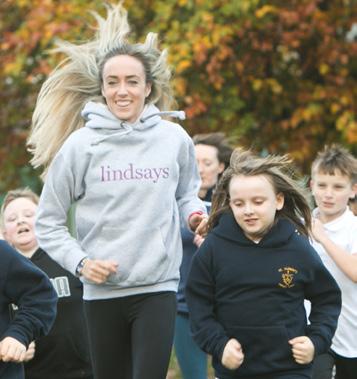

Our teams in Dundee and Edinburgh were delighted to host guests at recent ‘In Conversation with Eilish’ events where she captivated our audiences prompted by questions from Ian Beattie MBE, Chairman of UK Athletics and Lindsays Chief Operating Officer.

Our recent events with Eilish have been a tremendous chance to get people together to show how proud we are of Eilish and celebrate her remarkable success. It’s fascinating to hear the inside track on what’s been a phenomenal year. What’s more exciting is that we know there’s so much she still wants to achieve, and we are proud to sponsor her as she strides forward.
For me it’s important to have people like those at Lindsays who have stuck with me through my career. Lindsays has made an investment in me, not just as an athlete, but as a person. This year has been incredible for me and I’m super-excited by what lies ahead.
lindsays.co.uk issue 23
09
Eilish McColgan
Eilish winning Commonwealth Games Gold medal in the 10,000m in Birmingham.
Photo by Bobby Gavin.
Alasdair Cummings Managing Partner at Lindsays
Eilish training with pupils at Balgarthno Campus.
Eilish with Alasdair Cummings, Managing Partner at Lindsays.
Eilish's two Commonwealth Games medals - Gold and Silver.
All I want for Christmas
(or for any holiday)… is happy kids
Separated? Divorced? Keeping everyone happy when splitting time with kids over holiday periods can be tricky to manage. Here are our top tips on navigating your way to a merry Christmas for all.
Two parents living apart. Two different homes. Two sets of presents – isn’t that the bonus? When it comes to Christmas for children of separated parents, two lots of presents simply won’t make up for the stress of feeling pulled in all directions at a time when their happiness is meant to be top of the agenda. The key to giving your kids the best time over the festive period is planning contact arrangements ahead, amicably, with their best interests at heart.
Holidays, particularly Christmas, put extra pressures on all families, even more so when parents no longer live together.
Children can get caught in the middle, making what should be a happy time, completely miserable.
Parents need to take a grown-up approach, putting fair, child focused and sensible arrangements in place.
Plan ahead
Start communication with your expartner as early as you can. This helps everyone get their heads around what is a difficult transition from Christmases past. It will also avoid last minute disagreements when there may not be time to fully consider possible alternative arrangements.
Consider past family traditions - maybe there will have to be compromises or new traditions?
There is no legal default position on contact at Christmas except that those arrangements should be in the best interests of your children.
If parents are able to talk in advance it can help lessen the heat and emotion associated with spending time with your children at this time of year.
Ask the children
Christmas is essentially about the kids. If children are older, perhaps a parent can tactfully ascertain what they would like to do over the festive period. Is seeing both parents on Christmas Day important to them? Would they prefer to spend Christmas Day with one parent and Boxing Day with the other? However, parents have to be careful that they don’t put stress on the children to express a preference for one parent.
If the children are keen to have slices of Christmas Day together with both of their parents, it’s important to look at the practicalities of that. Assess travel times and the implications of bad weather conditions. No-one can afford to lose sight of the fact that the welfare and wellbeing of your children, at what should be one of the happiest times of year for them, is the most important thing.
Look at the bigger picture
Be empathetic. Be sensible. Christmas is not a time for one-upmanship over your ex - be that in time spent with the kids or number (or cost) of gifts given.
Don’t forget, there are other big days in the annual calendar requiring separated parents to cooperate such as birthdays, Easter and the summer holidays. Could it be helpful to think of the year as a whole and divvy up these significant dates so that your children get to spend a spread of special times with each parent across 12 months?
Nina Taylor Partner, Family Law ninataylor@lindsays.co.uk 0131 656 5788

10 lindsays life issue 23
Good charity needs good governance
Good governance allows great charity work to continue to flow whatever the current challenges bring.
If there’s anything that the last few years have taught those involved with charities and the third sector, it is that to tackle challenges and thrive as an organisation you must have your house in order.
And what makes a good charity robust in an unstable environment? Good governance.
Inspiring leadership
Given the ever-changing external factors currently adding to the day-today challenges of running a charity, it may sometimes seem like achieving your original charitable purpose is beyond reach. A key part of keeping your organisation on track involves good governance which comes from strong, inspiring leadership promoting solid procedures.
It’s important that leaders ensure their charity is well organised, appropriately structured, prepared to face sometimes difficult decisions and embrace change.
Strategy and advice
Strong strategy and well-informed legal advice will help you properly consider the consequences of your actions and make the right decisions. As ever, showing that matters are being dealt with is important, so keep a note of everything considered and any key decisions.
Whether your current queries relate to constitutional or operational issues, or to employment or property matters we have a team of experienced lawyersboth third sector specialists, and those from other fields - who will be able to advise.
Support your trustees
There has rarely been a more important time to ensure that trustees are properly prepared and briefed to meet the demands that charities face. Most charities, like any business, will be facing the impact of the economic pressure across society and trustees play a crucial role in helping steer the route through.
Trustees can sometimes feel criticised for not doing enough and some people may be deterred from becoming trustees for fear of what is involved. Effective training will help ensure they know about their responsibilities as well as dispelling the myths of being a trustee.
Good governance is essential for charities to effectively implement the changes required to ensure they not only survive, but thrive.
Ben Doherty
Partner, Charities & Third Sector Group
bendoherty@lindsays.co.uk 0141 302 8460

11
”
lindsays.co.uk issue 23
M ent al health m at t ers to us
Good mental health is something that can’t be taken for granted, especially in our current turbulent world. Lindsays has long been committed to taking mental health issues seriously. Continuing our support of SAMH is an integral part of our pledge to always place mental health at the top of the firm’s agenda.
Since 1923 SAMH has been working to end stigmas around mental health, providing support, awareness and help to those in need. The charity offers a programme of support and services for adults and young people.

Our staff are encouraged to fundraise for SAMH, from donating £1 for monthly Dressdown Friday, to contributing through our Pennies for Promise payroll scheme, which allows colleagues to donate directly to SAMH. We have also taken part in various volunteering activities with the organisation and supported its campaigns and events.
One such event took place in June when we partnered with SAMH to support its involvement in Edinburgh’s Van Gogh Alive Exhibition. This immersive exhibition gave visitors the opportunity to experience the work of Van Gogh by almost stepping into his paintings. We hosted a joint fundraising evening during the exhibition’s run where artwork created by school children was auctioned in support of SAMH, to ensure they can continue to be there for those who need them most in the wake of the Covid-19 pandemic.
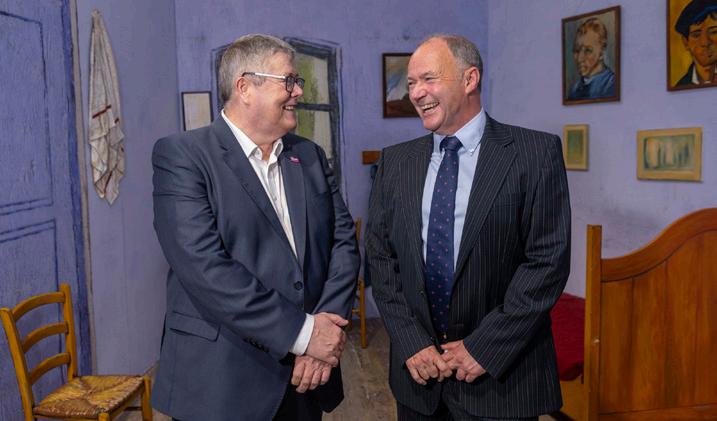
Our Chairman, Peter Tweedie said: “We were delighted to partner with SAMH to support its work with the team at Van Gogh Alive, not just to raise vital funds to aid the charity’s work but also to highlight important issues surrounding mental health. We work hard to create a healthy workplace for our colleagues and work with our clients to help them achieve the same. Encouraging positive mental health has never been more important.”

After the success of Van Gogh Alive, a few of our people, including Managing Partner, Alasdair Cummings visited SAMH’s Redhall Walled Garden to see first-hand how the charity uses funds. Its therapeutic garden is a beautiful and peaceful place where people can access support and recover from mental health issues.
Lindsays looks forward to more exciting ways to support SAMH as it continues this charity partnership.
12 lindsays life issue 23
The money raised by Lindsays helps us to provide support to those in our communities who need it most.
Billy Watson Chief Executive, SAMH
We are delighted to continue our longstanding support for the Scottish Association for Mental Health (SAMH).
L-R: Lindsays team visit to Redhall Walled Garden with SAMH - Becky Chenery (Redhall Gardens), Sharon Drysdale, Megan Fletcher, Susan Law, Alasdair Cummings, Shona Langlands (SAMH), Cara Burns, Caitlin Connolly, Karen Slaughter.
Billy Watson, SAMH Chief Executive and Peter Tweedie, Chairman at Lindsays.
Our sponsorship news Running on…into the future


We are delighted to announce an extension to our sponsorship of the Scottish Cross Country Season until the end of 2023/2024.
The running spikes are on, and the starter pistols have fired. The XC season has begun. We are delighted to be there – every step of the way.
We have enjoyed being part of the Cross Country (XC) world since 2014 when our partnership with scottishathletics and the Scottish XC Season began. The passion and enthusiasm for XC is evident at every event and we’re excited to be signed up now until the end of the 2023/2024 season. Entry



numbers just keep growing which adds to the competition for clubs coveting the Lindsays Trophy each season.
The triumphs of our elite athletes in Scotland are inspiring competitors at all levels and the continued success of this competition is testament to that. We wish good luck to all who take part in the months ahead.
Ian Beattie MBE Chief Operating Officer, Lindsays Chairman of UK Athletics
On our bikes
Cyclists from our three offices clocked up almost 1,000 miles and raised £1265 when they hit the road for the Tour de Forth 2022.
Our support for Tour de Forth started in 2017 and our colleagues have taken part in every event since then to raise funds.
The Tour de Forth in June this year saw over 500 participants cycle two routes from RBS Gogarburn around the River Forth – the 68-mile Classic and the 35mile Nouveau route. The riders battled high winds and showers high winds and showers but were motivated to raise as much as possible. The final total raised overall was an impressive £42,360.


Game-changers
We've been offering funding and mentorship to students competing in Abertay University's Dare Academy since 2017.


Summer 2022 saw six promising teams of gaming enthusiasts creating their own games and gaining advice and support from some of our lawyers should they decide to take their projects to the next level.
Our team did so well and while fun, it was also for a serious cause - Cash for Kids makes a remarkable difference to young lives. We are proud to support that and delighted to have played our part in the Tour de Forth again.
Peter Tweedie Chairman, Lindsays
The creativity and success of the gaming industry in Dundee and throughout Scotland is incredibly exciting. The bedrock of that success is ensuring they have the skills to succeed, creatively and economically. Dare Academy helps achieve that.
Kate Wyatt Partner, Lindsays
13 lindsays.co.uk issue 23
Photos by Bobby Gavin.
Say hello to the caveat: your simple, cost effective, early warning trigger system
So, you think you’d be the first to know if there was a court order against you or your business? Think again.
The caveat may not currently feature as a great Scottish invention but it really should. This little word has potentially great significance when it comes to you or your business.
Its literal Latin meaning, ‘let him beware’, gives you some insight into what a caveat can do for you.
So, what is a caveat?
Quite simply, it’s an electronic document that your solicitor lodges with the Court of Session and/or any of the Sheriff Courts throughout Scotland.
Without a caveat in place, the first you could hear about some types of court orders would be once the order is served on you.
What it does is much more significant. Where a caveat is in place, a court must tell your solicitor if a third party is seeking to obtain any one or more of a variety of court orders against you or your business without prior notice.
The court lodging dues are currently £46 per caveat. The caveat lasts 12 months and needs to be renewed annually to remain effective.
Why do you need a caveat?
Having a caveat in place means you can be alerted immediately by your lawyers should various types of court orders be sought against you. That could be:
• An interim order to prevent you undertaking building works.
• To prevent you from selling a product where your right to do so is disputed by a third party.
• To allow the service and advertisement of a petition: for the sequestration (ie. bankruptcy) of your estate; or to wind up your company.
Without a caveat lodged, the first you could hear about some types of court orders would be once the order is served on you. While you could still defend the proceedings, by that stage you may have already suffered damage to your reputation and face long-running financial consequences.
Who should have a caveat?
It’s not just individuals and businesses that should consider caveats. Trusts, charities and other organisations could also benefit from the early warning system that is the often-overlooked caveat.
How does it actually work?
If the caveat is triggered your solicitor will be notified by the relevant court. That notification provides an opportunity to act swiftly to resolve the situation before it spirals into something much more damaging. The caveat’s mechanism effectively ‘buys’ you time and provides you with an opportunity to avoid costly court proceedings and reputational damage.
The envy of the world
The caveat is often a source of envy to those outwith Scotland as it is such a simple device that can provide invaluable protection from the consequences of otherwise unforeseen court proceedings. We’re lucky to have it in our risk management toolkit and it could be the perfect way for you to avoid future strife.
Eve Skimins
Accredited Paralegal Dispute Resolution & Litigation eveskimins@lindsays.co.uk 0141 302 8445

lindsays life issue 23
14
Could you be due a potential payback on Inheritance Tax already paid?
Losing a loved one is awful enough. Don’t let overpaying the ‘most hated tax’ make it even more painful.
As we are all aware, recent world events have impacted the economy and resulted in volatile markets, including property and stock markets. Although nobody would want the value of their investments to fall, it can result in being able to claim for an Inheritance Tax (IHT) refund.
When someone dies their assets will be valued and any IHT due must be paid before anything in the estate can be passed to their beneficiaries.
If, when sold, certain assets are worth less than at the time of the person’s death some of the tax paid may be reclaimed.
Inherited property or shares may not then be sold by the executors for some time and could obviously change in value within that time.
The good news....
If, when sold, certain assets are worth less than at the time of the person’s death some of the tax paid may be reclaimed.
There is no automatic trigger for the refund...
Claims must be actively made to HMRC by the executors.
….and the not so good news However, all assets sold must be reported when submitting your claim, not just those sold at a loss. This means that if some investments have increased the amount of tax it’s possible to reclaim will be reduced.
Reclaims cannot be made for any investments or properties already transferred to beneficiaries who go on to sell them at a loss.
The time restrictions from the date of death for when assets must have been sold to potentially qualify for a reclaim are as follows:
• Stocks and shares - within 12 months.
• Property – within 4 years.
Being proactive pays
There is no automatic trigger for the refund – that would make life easy. Claims must be actively made to HMRC by the executors. It’s worth speaking to your lawyer if you think there’s a chance you may be due a refund
Clare McCarroll
Partner, Private Client Services
claremccarroll@lindsays.co.uk 0131 656 5609

15
lindsays.co.uk issue 23
News from Lindsays
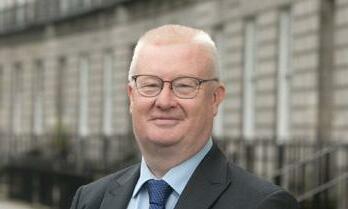
Accredited as a specialist in charity law by the Law Society of Scotland and a charity trustee herself, Helen’s experience is extensive.





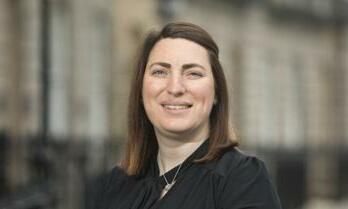
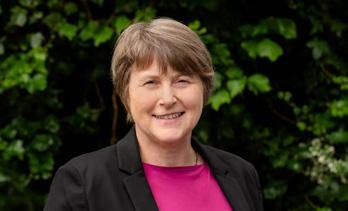
Helen has supported the setting up, merging and winding up of charities, as well as advising on matters relating to governance, charity tax, trustee training as well as dealing with wide-ranging regulatory issues throughout the sector.
Helen said: “I am delighted to be joining Lindsays, having been attracted by the strong reputation the firm has for its work across the third sector and the focus it places in providing targeted, specialist support.”
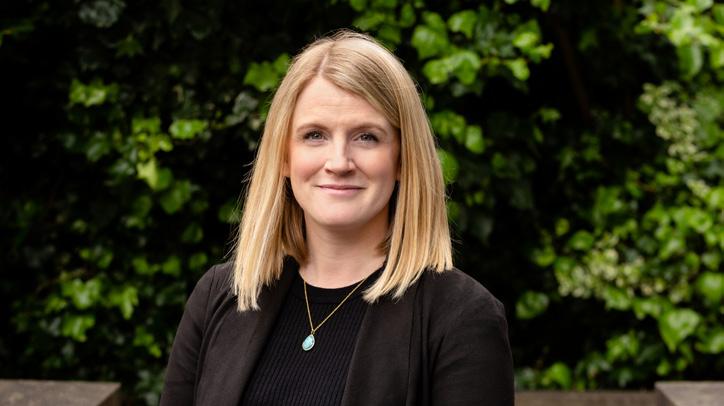
16 lindsays life issue 23
Helen Kidd | Partner Charities & Third Sector | Edinburgh
Jordan Hay | Senior Solicitor Private Client Services | Edinburgh
Gemma Johnstone | Solicitor
Commercial Property | Dundee
Martin Bennett | Director Commercial Property | Edinburgh
Maddie Miller | Solicitor
Commercial Property | Edinburgh
Heather Maltman | Solicitor
Dispute Resolution & Litigation | Edinburgh
Paige Burton | Solicitor
Family Law | Edinburgh
Vikki Carver | Solicitor
Commercial Property | Edinburgh & Dundee
Avril Greig | Senior Paralegal
Private Client Services | Dundee
A warm welcome to colleagues joining us across the firm
We are delighted to introduce our new Partner, Helen Kidd





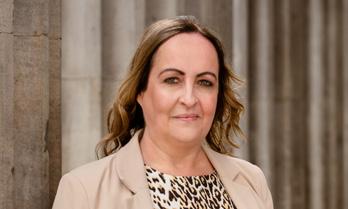

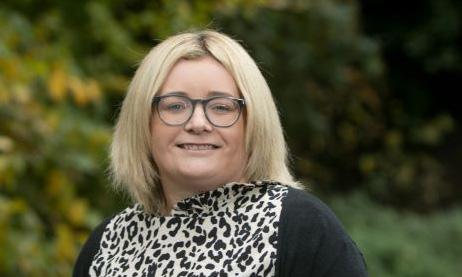





17 lindsays.co.uk issue 23
Alison Crawford | Paralegal Personal Injury | Glasgow
Curtis Preston | Solicitor Corporate | Edinburgh
Ronan Duff | Solicitor
Personal Injury | Glasgow
Stephanie Goudie | Solicitor Commercial Property | Glasgow
Congratulations to our newly qualified solicitors
Deborah-Anne O'Donnell | Solicitor Private Client Services | Dundee
Lisa McCallum | Trainee Paralegal Residential Property | Glasgow
Robert Martin | Paralegal Rural Services | Edinburgh
Claire Ross | Property Negotiator Estate Agency | Dundee
Carla Cadona | Trainee Solicitor Personal Injury | Glasgow
Jonathan Carey | Trainee Solicitor Employment | Glasgow
Emma McFarlane | Trainee Solicitor Residential Conveyancing | Dundee
Kaytlin Irvine | Trainee Solicitor Commercial Property | Edinburgh
Kirsten Boettcher | Trainee Solicitor Dispute Resolution & Litigation | Edinburgh
Sign up for lindsays life
We produce two issues of lindsays life each year which you can either receive by email or view on our website.


Previous issues can be viewed here.
lindsays life lindsays lindsayslife
lindsays
lindsayslife

We also produce news articles and updates on legal issues affecting you, your family and your business.

To receive relevant updates from us, click here.

18 lindsays life issue 23
Issue
22

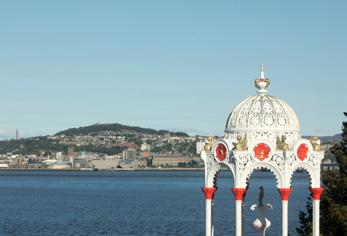


19 Edinburgh Caledonian Exchange 19a Canning Street Edinburgh EH3 8HE T: 0131 229 1212 F: 0131 229 5611 E: edinburgh@lindsays.co.uk Glasgow 100 Queen Street Glasgow G1 3DN T: 0141 221 6551 F: 0141 222 2707 E: glasgow@lindsays.co.uk Dundee Seabraes House 18 Greenmarket Dundee DD1 4QB T: 01382 224112 F: 01382 200109 E: dundee@lindsays.co.uk lindsays offices You can now find us on Instagram. Feel free to follow us and read our latest legal news and insights showcasing our people, legal services and our partnerships. Scan the QR code to visit our Instagram profile Or search for us on: Instagram | @lindsayslegal Get social lindsays.co.uk issue 23 @lindsays @lindsaysnews @lindsayssolicitors
lindsays life

www.lindsays.co.uk

 Peter Tweedie Chairman
Peter Tweedie Chairman







































































